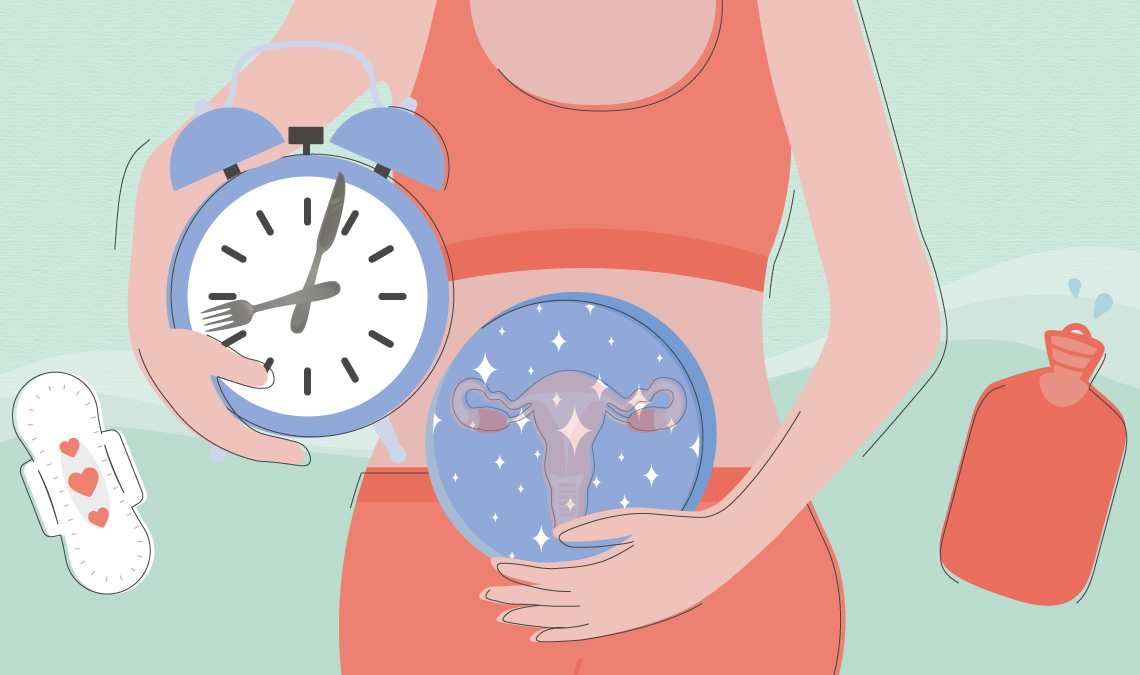Fasting during menstruation isn’t one-size-fits-all. Whether you fast for spiritual reasons, as part of your wellness routine, or during cultural events like Navratri or Ramadan (although in many cultures, women don’t fast if they are on their period), it’s totally valid to wonder how that fits with your cycle.
Because here’s the truth, our bodies go through a lot during our periods. And adding fasting into the mix can sometimes feel empowering… or honestly, just exhausting. So if you’ve ever felt conflicted, guilty, or just confused about whether you “should” fast while on your period, this one’s for you.
Let’s unpack the science, the cultural norms, and most importantly, what feels right for your body.
Can you fast during your period?
Yes, you can fast during your period, but it’s important to consider your body’s needs while menstruation.
During your period, your body is already using up a lot of energy. You’re literally shedding the lining of your uterus while navigating hormone chaos. Fasting can add extra stress, especially if it means you’re not eating enough or staying hydrated enough.
That doesn’t mean fasting during menstruation is harmful. It just means it’s a time to be more mindful and gentle. Listen in, not just check boxes.
Could fasting during menstruation be bad for your health?
Maybe, depending on how your body handles it. Research shows that fasting could cause menstrual abnormalities. Let’s break how and why:
- Nutritional Needs: During menstruation, women may experience increased nutritional requirements, particularly for iron and other essential nutrients lost through menstrual bleeding. Fasting may exacerbate these deficiencies, potentially leading to fatigue, weakness, and other health issues.
- Hydration: Staying hydrated is crucial during menstruation to help alleviate symptoms such as bloating and fatigue. Fasting, especially if it involves abstaining from fluids, can lead to dehydration, which may worsen menstrual discomfort and affect overall health.
- Energy Levels: Many women experience fluctuations in energy levels during menstruation, with some feeling more fatigued than usual. Fasting may further deplete energy reserves, making it challenging to cope with the demands of daily life and potentially exacerbating feelings of tiredness and lethargy.
- Hormonal Balance: Hormonal changes during menstruation can affect mood, appetite, and energy levels. Fasting may disrupt hormonal balance, leading to mood swings, irritability, and other emotional symptoms commonly associated with PMS (premenstrual syndrome).
Alternatives to Fasting During Menstruation
If you’re craving the intention behind fasting — the reset, the reflection, the discipline — but your body’s just not on board right now, try this instead:
- Mindful Eating: Instead of fasting, focus on consuming nourishing foods that support overall health and vitality. Opt for nutrient-rich foods such as fruits, vegetables, whole grains, lean proteins, and healthy fats to support energy levels and hormonal balance. Here’s a guide for what you should eat during your period.
- Hydration: Drink plenty of fluids, including water, herbal teas, and electrolyte-rich beverages, to stay hydrated during menstruation. Proper hydration can help alleviate symptoms such as bloating, cramps, and fatigue, promoting greater comfort and well-being. Nua’s Period Pain Relief Drink Mix is also a great option to relieve period pain!
- Gentle Movement: Engage in gentle physical activities such as walking, yoga (here are some poses you could try), or tai chi to support circulation, relieve tension, and improve mood during menstruation. Gentle movement can help alleviate menstrual discomfort and promote relaxation and overall well-being.
- Self-Care Practices: Prioritise self-care activities such as rest, relaxation, meditation, and stress management techniques during menstruation. Taking time to nurture your body and mind can help alleviate symptoms and enhance your overall sense of well-being.
Why do most religions exempt you from fasting during your period?
Because maybe, just maybe, they understood it’s not the time to deprive your body.
Most major religions and cultures don’t require women to fast while menstruating. And contrary to what some might think, that’s not necessarily about viewing periods as “impure” or women as “lesser.” It could actually reflect a deep-rooted understanding of just how physically demanding menstruation is.
Centuries ago, long before we had the science to back it up, there was already an intuitive respect for the cyclical nature of a woman’s body and how fasting during menstruation might not be supportive or sustainable.
So it might not be about exclusion, maybe it’s about looking out for you. Maybe it’s about permission to rest, recover, and recalibrate, without guilt.
So… should you fast during your period?
Only you get to answer that.
Fasting during menstruation isn’t about right or wrong, it’s about tuning into what your body needs, what your beliefs hold space for, and what version of you you want to show up as.
And whatever you choose, let it come from love, not pressure.
You’re not less spiritual, strong, or disciplined for honouring your body. You’re wise. And that matters more than any rulebook.
Read about fasting during Navratri and menstruation here.



